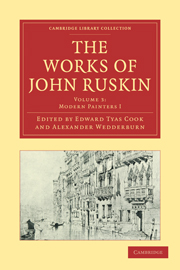Book contents
- Frontmatter
- Contents
- LIST OF ILLUSTRATIONS
- INTRODUCTION TO THIS VOLUME
- BIBLIOGRAPHICAL NOTE
- MODERN PAINTERS VOLUME I
- AUTHOR'S PREFACE TO FIRST EDITION (1843)
- AUTHOR'S PREFACE TO SECOND EDITION (1844)
- AUTHOR'S PREFACE TO THIRD EDITION (1846)
- AUTHOR'S PREFACE TO NEW EDITION (1873)
- AUTHOR'S SYNOPSIS OF CONTENTS
- PART I OF GENERAL PRINCIPLES
- SECTION I OF THE NATURE OF THE IDEAS CONVEYABLE BY ART
- CHAPTER 1 INTRODUCTORY
- CHAPTER II DEFINITION OF GREATNESS IN ART
- CHAPTER III OF IDEAS OF POWER
- CHAPTER IV OF IDEAS OF IMITATION
- CHAPTER V OF IDEAS OF TRUTH
- CHAPTER VI OF IDEAS OF BEAUTY
- CHAPTER VII OF IDEAS OF RELATION
- SECTION II OF POWER
- PART II OF TRUTH
- SECTION I GENERAL PRINCIPLES RESPECTING IDEAS OF TRUTH
- SECTION II OF GENERAL TRUTHS
- SECTION III OF TRUTH OF SKIES
- SECTION IV OF TRUTH OF EARTH
- SECTION V OF TRUTH OF WATER
- SECTION VI OF TRUTH OF VEGETATION.—CONCLUSION
- Appendix
- Plate section
CHAPTER 1 - INTRODUCTORY
Published online by Cambridge University Press: 07 September 2011
- Frontmatter
- Contents
- LIST OF ILLUSTRATIONS
- INTRODUCTION TO THIS VOLUME
- BIBLIOGRAPHICAL NOTE
- MODERN PAINTERS VOLUME I
- AUTHOR'S PREFACE TO FIRST EDITION (1843)
- AUTHOR'S PREFACE TO SECOND EDITION (1844)
- AUTHOR'S PREFACE TO THIRD EDITION (1846)
- AUTHOR'S PREFACE TO NEW EDITION (1873)
- AUTHOR'S SYNOPSIS OF CONTENTS
- PART I OF GENERAL PRINCIPLES
- SECTION I OF THE NATURE OF THE IDEAS CONVEYABLE BY ART
- CHAPTER 1 INTRODUCTORY
- CHAPTER II DEFINITION OF GREATNESS IN ART
- CHAPTER III OF IDEAS OF POWER
- CHAPTER IV OF IDEAS OF IMITATION
- CHAPTER V OF IDEAS OF TRUTH
- CHAPTER VI OF IDEAS OF BEAUTY
- CHAPTER VII OF IDEAS OF RELATION
- SECTION II OF POWER
- PART II OF TRUTH
- SECTION I GENERAL PRINCIPLES RESPECTING IDEAS OF TRUTH
- SECTION II OF GENERAL TRUTHS
- SECTION III OF TRUTH OF SKIES
- SECTION IV OF TRUTH OF EARTH
- SECTION V OF TRUTH OF WATER
- SECTION VI OF TRUTH OF VEGETATION.—CONCLUSION
- Appendix
- Plate section
Summary
Public opinion no criterion of excellence, except after long periods of time.
If it be true, and it can scarcely be disputed, that nothing has been for centuries consecrated by public admiration, without possessing in a high degree some kind of sterling excellence, it is not because the average intellect and feeling of the majority of the public are competent in any way to distinguish what is really excellent, but because all erroneous opinion is inconsistent, and all ungrounded opinion transitory; so that, while the fancies and feelings which deny deserved honour, and award what is undue, have neither root nor strength sufficient to maintain consistent testimony for a length of time, the opinions formed on right grounds by those few who are in reality competent judges, being necessarily stable, communicate themselves gradually from mind to mind; descending lower as they extend wider, until they leaven the whole lump, and rule by absolute authority, even where the grounds and reasons for them cannot be understood. On this gradual victory of what is consistent over what is vacillating, depends the reputation of all that is highest in art and literature; for it is an insult to what is really great in either to suppose that it in any way addresses itself to mean or uncultivated faculties. It is a matter of the simplest demonstration, that no man can be really appreciated but by his equal or superior.
- Type
- Chapter
- Information
- The Works of John Ruskin , pp. 79 - 86Publisher: Cambridge University PressPrint publication year: 2010First published in: 1903

